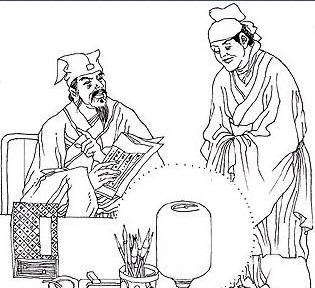《送东阳马生序》是明初宋濂送给他的同乡浙江东阳县青年马君则的文章。在这篇赠言里,作者叙述个人早年虚心求教和勤苦学习的经历,勉励青年人珍惜良好的读书环境,专心治学。文中生动而具体地描述了自己借书求师之难,饥寒奔走之苦,并与太学生优越的条件加以对比,有力地说明学业能否有所成就,主要在于主观努力,不在天资的高下和条件的优劣,这种认识在今天仍有借鉴意义。

《送东阳马生序》 宋濂
余幼时即嗜学。家贫,无从致书以观,每假借于藏书之家,手自笔录,计日以还。天大寒,砚冰坚,手指不可屈伸,弗之怠。录毕,走送之,不敢稍逾约。以是人多以书假余,余因得遍观群书。
既加冠,益慕圣贤之道,又患无硕师名人与游,尝趋百里外,从乡之先达执经叩问。先达德隆望尊,门人弟子填其室,未尝稍降辞色。余立侍左右,援疑质理,俯身倾耳以请。或遇其叱咄,色愈恭,礼愈至,不敢出一言以复。俟其欣悦,则又请焉。故余虽愚,卒获有所闻。
当余之从师也,负箧曳屣,行深山巨谷中。穷冬烈风,大雪深数尺,足肤皲裂而不知。至舍,四支僵劲不能动,媵人持汤沃灌,以衾拥覆,久而乃和。寓逆旅,主人日再食,无鲜肥滋味之享。同舍生皆被绮绣,戴朱缨宝饰之帽,腰白玉之环,左佩刀,右备容臭,烨然若神人。余则缊袍敝衣处其间,略无慕艳意;以中有足乐者,不知口体之奉不若人也。盖余之勤且艰若此。今虽耄老,未有所成,犹幸预君子之列,而承天子之宠光,缀公卿之后,日待坐,备顾问,四海亦谬称其氏名,况才之过于余者乎?
今诸生学于太学,县官日有廪稍之供,父母岁有裘葛之遗,无冻馁之患矣;坐大厦之下而诵《诗》《书》,无奔走之劳矣;有司业、博士为之师,未有问而不告,求而不得者也;凡所宜有之书皆集于此,不必若余之手录,假诸人而后见也。其业有不精,德有不成者,非天质之卑,则心不若余之专耳,岂他人之过哉?
东阳马生君则,在太学已二年,流辈甚称其贤。余朝京师,生以乡人子谒余,撰长书以为贽,辞甚畅达。与之论辨,言和而色夷。自谓少时用心于学甚劳,是可谓善学者矣。其将归见其亲也,余故道为学之难以告之。谓余勉乡人以学者,余之志也;诋我夸际遇之盛大而骄乡人者,岂知予者哉!
A Farewell to Ma Junze of Dongyang
Song Lian
In my adolescence I was fond of reading. My family being poor, I had no access to books, which I had to borrow from bibliophiles, taking whole passages down before I returned them on the appointed date. Although the frigid weather caused the inkstone to be crusted with ice and made my fingers unable to bend or stretch, I could not afford to be slow. Having copied what I needed, I sent the books back to the owner, not daring to delay a single day. Thus many gentlemen were glad to lend me books, and I was fortunate enough to read over piles of them.
After I had come of age, I worshipped all the more the teachings of sages. As I feared lest I should be out of contact with great masters and notables, I had to walk a hundred li in order to seek instructions in the scriptures from an eminent local scholar. Since he possessed good virtues and enjoyed high prestige, his room was filled with pupils, before whom he never relaxed a little his severe countenance. I stood there, waiting upon him patiently. When it was the right moment, I made bold to ask him some questions to solve my puzzles and elucidate the reasons, bowing to him all the time with great attention. Or I might be given a reproval, then I became even more deferential and more submissive, not daring to utter a single word to contradict him. Only when he was good-humoured again, did I continue to ask him. Thus, stupid as I was, I gained eventually some learning.
The day when I first went to school, I, burdened with my suitcase and dragging my feet, trudged into unfrequented mountains and valleys, braving the vehement winter gale and crunching through snow several feet deep, unaware that my legs had become chapped. When I arrived at our inn, my limbs were numbed and stiff, and it was a long time before I was warmed up with the help of a servant, who gave me hot water to drink and tucked me in with a quilt. The innkeeper offered me only two meals a day, without any dainty food. My fellow students lodging in the same inn were all dressed in silk and satin, wearing hats decorated with tassels of precious stones and girded with sashes of white jade hung with swords on the left and sachets on the right, looking as bright as fairies, while I, in striking contrast, was clothed in an outworn padded robe and a shabby dress. Living among them, I was not in the least envious of their foppery. Because I was contented with the happiness of learning and was unconscious of my inferiority to others in terms of physical gratification. Such was my diligence and hardship. Although I am now stricken in years and have few achievements, I am fortunate enough to place myself in the ranks of gentlemen, bask in the grace of the Sovereign, attach myself to the retinue of nobility and wait upon the Emperor in the capacity of counselor. The whole nation also designs to blaze my name. How much more exalted must be people who are more talented than I?
Now you young scholars studying at the Imperial College are granted stipends by the government and provided with fur coats and summer wears by your parents, free of cold and starvation. Now you are living in grand memories, reading books and intoning poems, saved the trouble of shuttling over a long distance. Now you have experts and doctors as your teachers, with no questions unanswered and no requests denied. All indispensable books are collected here at your disposal, and you need not copy them as I did to borrow them from others. If there be young men who are wanting in accomplishments of learning our virtues, it must be either owing to their inferior gifts or to their lack of the same application as I had in my youth. Who but they themselves are to blame?
Ma Junze of Dongyang has studied at the Imperial College for two years and has been highly appreciated by his fellow-students for his good character. As I have been staying in the capital, he has paid me a visit by virtue of his being a junior townsman of mine and presented me with a long epistle which is distinguished by a fluent and lucid style. His discussions and arguments with me also revealed his elegance of speech and gentility of manner. By his own account, in his adolescence he devoted himself to learning with great assiduity, and might be regarded as a good learner. On the occasion of his homecoming, I set forth to him the hardships of learning. To say that I encourage my townsmen to study hard is to help me make clear my sincere wish to them. To slander me that I try to humble them by flaunting my dignified position proves indeed a failure to understand me!
更多精品翻译素材,敬请关注可可英语。












